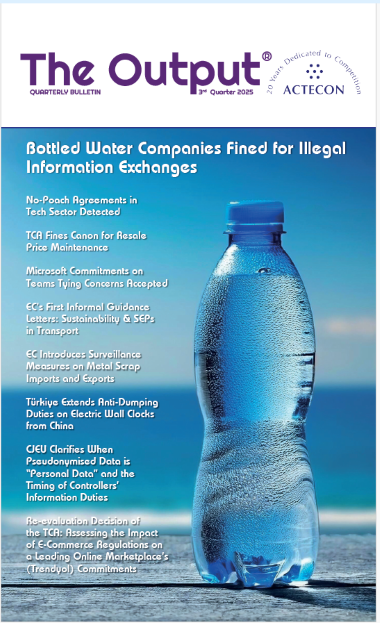TCA is Signalling a Strict Approach to the Prevention of Parallel Trade
| Competition Law

TCA is Signalling a Strict Approach to the Prevention of Parallel Trade
Authors: Barış Yüksel, Nabi Can Acar, and Burak Buğrahan Sezer
Introduction
On 29.01.2020, Turkish Competition Authority (“TCA”) announced its final decision (“Final Decision”) concerning the investigation conducted against Artı Marin Mobil Enerji Sistemleri Inc. (“Artı Marin”) and Mastervolt International Holding BV (“Mastervolt”), a Netherlands based energy solutions company. The TCA imposed an administrative fine on Mastervolt, for obstructing parallel trade to Turkish market. The TCA’s reasoning as to the fining decision is yet to be published. It should be noted that the fining decision has been taken as a result of a re-initiated investigation which dates to 2016 (“2016 Decision[1]”) as a result of which, the TCA determined that there was no violation of The Law No. 4054 on The Protection of Competition (“Competition Law”). The 2016 Decision was reversed by the Administrative Court during its judicial review (“Reversal Decision[2]”).
In the 2016 Decision, after evaluating the case at the hand, the TCA decided not to impose a fine. It was emphasized that the conduct did not have any effect on the market since parallel trade was not obstructed in practice. However, the Administrative Court deemed that the data collected by the TCA was sufficient to conclude that the Competition Law was violated and overturned the TCA’s decision.
The 2016 Decision of the TCA
The 2016 Decision had been taken as a result of an investigation initiated upon a complaint made by Eltesan Mobil Teknoloji Sistemleri San. ve Tic. A.Ş (“Eltesan”), which was engaged in the parallel trade of Mastervolt products, despite being authorized by Mastervolt to sell its products in Turkey. In its complaint, Eltesan claimed, inter alia, that (i) Artı Marin did not face any competition in Turkey for Mastervolt products thanks to the exclusivity provided by the agreement between Mastervolt and Artı Marin, (ii) due to lack of competition, Artı Marin imposed unreasonably high prices, (iii) Eltesan was able to import from Mastervolt’s authorized dealers in different countries and supply products to Turkey with lower prices and (iv) Artı Marin and Mastervolt attempted to block the Eltesan’s sales via prohibiting Eltesan’s trade partners in European countries (which are authorized dealers of Mastervolt) from engaging in any trade with Eltesean.
In the case at the hand, upon Artı Marin’s complaint to Mastervolt; Mastervolt sent out letters to end-users in Turkey, stating that Artı Marin is the officially appointed representative of Mastervolt in Turkey and that Mastervolt products should be sold, installed and serviced by well-trained engineers due to their technical characteristics. The letters further noted that serving Mastervolt products without in-depth training and up-to-date technical knowledge can result in major malfunctions and therefore when the supplier of a product is unknown and/or is an unauthorized party, any warranty claims and/or requests for products and systems would always be refused by Mastervolt. In addition to this, by using the serial numbers of the products sold to Eltesan, Mastervolt tracked down the authorized dealers in Europe that engaged in a trade relationship with Eltesan and pressured them to cease their supply. Specifically, the TCA found documentation showing that Mastervolt sent a warning to an authorized dealer in Austria, requesting it to stop dealing with Eltesan immediately, as a result of which, the said dealer contacted Eltesan and stipulated that they would no longer be supplying products to Eltesan.
The TCA concluded that in light of the available information (especially considering the communications between Mastervolt and its authorized dealer in Austria), it may be claimed that there is an agreement between Mastervolt and Artı Marin that concerns the prevention of Mastervolt’s sales to Turkey via authorized dealers in other countries. Yet, the TCA further stated that in practice it was not possible to prevent parallel trades and that Mastervolt’s intervention did not lead to a decrease in Eltesan’s sales during the periods subject to examination.
The TCA then moved on to its legal assessment and it referred to the precedents of the European Commission (“Commission”) and the European Court of Justice (“ECJ”) (specifically to the Consten and Grundig[3] decision of the ECJ in 1966), which strictly prohibit any vertical arrangements that prevent or hinder parallel trading within the EU Member States and considers such agreements as “by object” violations, the effects of which need not be further assessed to determine their illegality. The TCA expressed that it would have been possible to hold that the agreement between Artı Marin and Mastervolt concerning the effort to prevent parallel imports constitutes a violation under the EU law, mainly due to EU law’s specific prioritization of the preservation and protection of the single market.
However, the TCA emphasized that the consequences of the prevention of parallel trade would be different in EU which is a union that comprises of different country markets and Turkey, where the national borders constitute a single market. In the 2016 Decision, it was argued by the TCA that the reason why EU law is so stringent towards practices that aim to prevent parallel trade is the sensitivity of “preventing the fragmentation of the single market” as a policy. According to the TCA, the structural differences in Turkey would justify conducting a more detailed assessment of the idiosyncrasies of the concrete case although such differences would not require a categorical assumption that agreements restricting parallel trades may never constitute a violation.
In light of this approach, the TCA examined Mastervolt’s conduct in the case at hand and determined the following: (i) as the Mastervolt’s response to Artı Marin indicates, it is not possible to block the exports of all of its dealers in the EU to Turkey and (ii) the share of Mastervolt products within Eltesan’s total revenue is considerably low. Therefore, the TCA concluded that the available data is insufficient to prove the existence and effect of an anti-competitive agreement between Artı Marin and Mastervolt within the meaning of Article 4 of the Competition Law.
Administrative Court’s Reversal and the TCA’s Final Decision
The Administrative Court considered that the information and documents obtained by TCA are sufficient to reveal the parties’ intention to restrict competition and thus determined that the conduct constituted a violation of Article 4 of the Competition Law. Therefore, the Administrative Court overturned the TCA’s 2016 Decision.
Upon Administrative Court’s Reversal Decision, the TCA conducted an additional process and decided to fine Mastervolt due to violating Article 4 of the Competition law that prohibits anti-competitive agreements via obstructing parallel trade whereas Artı Marin was not fined. Prior to the publication of the reasoned decision, it is not possible to make a definitive conclusion as to why TCA solely fined Mastervolt. However, it the TCA may have taken a similar approach with resale price maintenance cases and vertical restraints leading to exclusivity. This may be due to the TCA’s understanding that the supplier’s intention is definitive in obstructing parallel trade although the distributor benefits most from such agreements. Indeed, the 2016 Decision is also indicating this tendency; while distributor’s complaints to supplier and supplier’s responses are not considered as an anti-competitive agreement, supplier’s actions upon distributor’s complaints are considered to reveal the existence of an anti-competitive agreement.
It is also not clear whether the TCA changed its approach with respect to the legal categorization of agreements concerning obstruction of parallel trade upon the Administrative Courts’ Reversal Decision and considered these agreements as violation by object. The reasoned decision to be published is of crucial importance since it may mark a departure from an effects-based approach to an intention-based approach with little or no regard to the actual effects of an obstruction of parallel trade.
In case the TCA deems obstruction of parallel trade as a violation by object, this decision may have far reaching consequences for the application of Turkish Competition Law; it may lead on the conclusion that any restrictions of parallel exports out of any EEA country are likely to be considered to be generally unlawful under Turkish Competition Law. For example, a distribution agreement concluded between a US supplier and a US distributor including a ban to export goods out of US may be deemed as unlawful under Turkish Competition Law, if certain undertakings in Turkey are not able to procure the relevant goods from the distributors in the US because of these agreements. The same may be applied to agreements prohibiting exports out of the EEA (because Turkey is not a part of the EEA). TCA’s decision may require distribution agreements originating in EEA to treat the territory of Turkey as if Turkey were an EEA member state. As a final remark, it should be reminded that a closer scrutiny of the situation in Switzerland that emerged after Swiss Competition Commission’s (“ComCo”) Elmex[4] and BMW[5] decisions which were upheld by the Swiss Federal Supreme Court[6] may be required for foreign undertakings that are currently working with an exclusive distributor in Turkey.
[1] TCA’s Decision dated 11.05.2016 numbered 16-16/278-122.
[2] Ankara 7th Administrative Court’s (“Administrative Court”) Decision dated 28.11.2018 and numbered E: 2017/251, K: 2018/2104.
[3] Joined cases 56 and 58-64, Établissements Consten S.à.R.L. and Grundig-Verkaufs-GmbH v Commission of the European Economic Community, ECR 1966/299 [1966].
[4] ComCo’s Decision dated 30.11.2009 numbered 22-0349.
[5] ComCo’s Decision dated 07.05.2012 numbered 22-0408.
[6] Federal Supreme Court’s Decisions respectively; dated 28.06.2016 and numbered 2C_180/2014 and dated 24.10.2017 and numbered 2C_63/2016.






